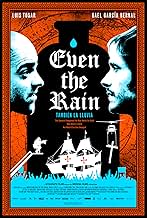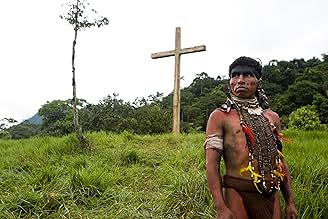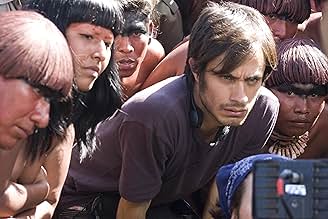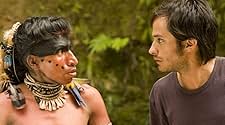CALIFICACIÓN DE IMDb
7.4/10
15 k
TU CALIFICACIÓN
Un director y su equipo se disponen a filmar una controvertida película sobre Cristóbal Colón en Cochabamba, Bolivia. Los lugareños organizan una revuelta contra la inminente privatización d... Leer todoUn director y su equipo se disponen a filmar una controvertida película sobre Cristóbal Colón en Cochabamba, Bolivia. Los lugareños organizan una revuelta contra la inminente privatización del agua.Un director y su equipo se disponen a filmar una controvertida película sobre Cristóbal Colón en Cochabamba, Bolivia. Los lugareños organizan una revuelta contra la inminente privatización del agua.
- Premios
- 22 premios ganados y 17 nominaciones en total
- Dirección
- Guionista
- Todo el elenco y el equipo
- Producción, taquilla y más en IMDbPro
Opiniones destacadas
I really enjoyed the film "Even in the Rain" because the movie had two stories going side by side. It was like a movie inside a movie, which was one thing that I really enjoyed about the movie. Overall the movie was very easy to understand. There might have been one scene that was not that clear to me but I got the general idea of it anyways so it was not really a big problem. If this was an American film the problem would have been solved in the movie, so it different from American films. To my understanding the problem was not resolved in this film. This film taught me how people in other parts of the world are living today and that people do not have the things that we take for granted all time. Also this film sort of taught us about the past which I taught was very interesting. It showed us how the British were treating the Natives. If was the director of this film I would have made it so at the end of the film everyone had water.
EVEN THE RAIN (También la lluvia) is a brilliant metaphor of a story written by Paul Laverty based on an actual event and directed with considerable skill by Icíar Bollaín, the great Spanish actress, writer and director. This film is one of those rare 'docudramas' that bring to light historical 'secrets' that beg to be shared. In 2000 an American water company bought the water supply from the Bolivian government and the citizens of Bolivia were banned from collecting rainwater which had become corporate property. This resulted in a violent protest against the government by the indigenous Indians and the citizenry of Cochambamba, Bolivia who claimed their rights to the natural gifts of nature - even the rain. Laverty and Bollaín expose this injustice through a well-conceived story within a story.
Spanish film director Sebastián (Gael García Bernal), his cynical producer Costa (Luis Tosar), and crew including Antón (Karra Elejalde) have come to Cochabamba, Bolivia to shoot their film about Christopher Columbus (played by actor Antón - Karra Elejalde) and his first explorations, revealing the way the Spaniards treated the native Indians: Costa has chosen the place because he can get cheap labor in using local actors and extras to keep within the small budget of the film. Sebastián is the compassionate one who wants the Indians treated well, hiring a mouthy young Indian named Hatuey/Daniel (Juan Carlos Aduviri) when he claims he and his family are being unjustly overlooked as actor candidates. The filming goes well, with the exception of some minor glitches for particular scenes the Indians find too dangerous, until a conflict develops over the governmental privatization of the water supply. Daniel becomes an activist against the government who plan a 300% increase in price of water - the average daily income for the Indians is $2. a day! - and the conditions in the city become unfriendly for the film to continue. Bloody violence and chaos breakout and many citizens are being killed or jailed. It is at this point that the caring Sebastián finally decides that he and his crew must flee, and with some role reversal, Costa stays behind to protect Daniel's family.
According to Bollaín, 'It was the gold 500 years ago, and now it's the water, which is the gold of the 21st century. Before it was the Crown of Spain and the pope who approved the conquest. Now it is the new theologians, the IMF and the World Bank. Again it's the word from above, saying, 'This is right.' The Spanish filmmakers in the film-within-a-film are caught in the middle. They have the attitude of neo-conquerors - they go there because it's cheap. But they're also trying to make a film that casts a different look on the conquest. And it's an adventure.'
Iciar Bollaín directs this epic film with great dignity and with a keen observation of how history, even inadvertently, repeats itself. The cinematography by Alex Catalán and the musical score by Alberto Iglesias add immeasurably to the film's success. The cast of extras is exceptional and very well directed. Both Gael García Bernal and Luis Tosar deliver intensely considered performances as does Juan Carlos Aduviri as the key central figure Daniel. Hopefully this film, nominated for Best Foreign Film in the 2010 Academy Awards. In Spanish with English subtitles.
Grady Harp
Spanish film director Sebastián (Gael García Bernal), his cynical producer Costa (Luis Tosar), and crew including Antón (Karra Elejalde) have come to Cochabamba, Bolivia to shoot their film about Christopher Columbus (played by actor Antón - Karra Elejalde) and his first explorations, revealing the way the Spaniards treated the native Indians: Costa has chosen the place because he can get cheap labor in using local actors and extras to keep within the small budget of the film. Sebastián is the compassionate one who wants the Indians treated well, hiring a mouthy young Indian named Hatuey/Daniel (Juan Carlos Aduviri) when he claims he and his family are being unjustly overlooked as actor candidates. The filming goes well, with the exception of some minor glitches for particular scenes the Indians find too dangerous, until a conflict develops over the governmental privatization of the water supply. Daniel becomes an activist against the government who plan a 300% increase in price of water - the average daily income for the Indians is $2. a day! - and the conditions in the city become unfriendly for the film to continue. Bloody violence and chaos breakout and many citizens are being killed or jailed. It is at this point that the caring Sebastián finally decides that he and his crew must flee, and with some role reversal, Costa stays behind to protect Daniel's family.
According to Bollaín, 'It was the gold 500 years ago, and now it's the water, which is the gold of the 21st century. Before it was the Crown of Spain and the pope who approved the conquest. Now it is the new theologians, the IMF and the World Bank. Again it's the word from above, saying, 'This is right.' The Spanish filmmakers in the film-within-a-film are caught in the middle. They have the attitude of neo-conquerors - they go there because it's cheap. But they're also trying to make a film that casts a different look on the conquest. And it's an adventure.'
Iciar Bollaín directs this epic film with great dignity and with a keen observation of how history, even inadvertently, repeats itself. The cinematography by Alex Catalán and the musical score by Alberto Iglesias add immeasurably to the film's success. The cast of extras is exceptional and very well directed. Both Gael García Bernal and Luis Tosar deliver intensely considered performances as does Juan Carlos Aduviri as the key central figure Daniel. Hopefully this film, nominated for Best Foreign Film in the 2010 Academy Awards. In Spanish with English subtitles.
Grady Harp
I found it very easy to identify with all of the main players thanks to some great performances from all involved and also a really nicely written script. It's really well shot with nice big, easily legible subtitles (more like this please foreign filmmakers!). It was interesting to see a film set in that region, we don't see very much from that part of the world. There are also some historical facts about the conquistadors that I wasn't aware of and so it even educated be a little! I love the way it slowly dawns on the crew that the mistakes made 500 years previously are still being made today! Over all, I found it well worth a look and it's one I would certainly look at again sometime.
SteelMonster's verdict: RECOMMENDED
My score: 8.3/10
You can find an expanded version of this review on my blog: Thoughts of a SteelMonster.
SteelMonster's verdict: RECOMMENDED
My score: 8.3/10
You can find an expanded version of this review on my blog: Thoughts of a SteelMonster.
EVEN THE RAIN, directed by Icíar Bollaín, is a compelling film which attempts to explore the history of global economics using a kind of cinematic metaphor. Bollain's film focuses on a multinational movie crew that travels to Bolivia to make a film about Christopher Columbus, and examines his agenda of religious, cultural, and monetary exploitation of The New World. The production company hits a snag when locally violent demonstrations breakout against corporate ownership of indigenous water rights, and threaten to make the completion of the film impossible. The movie shows that the issues of wealth, ownership, and power are just as contentious today as they were five hundred years ago. Corporate giants of our era employ the same greedy strategy in an attempt to steal wealth, power, and access from the uninformed and defenseless. Although the ethical issues in the film are sometimes presented in a slightly heavy-handed manner, by the end of the feature, it is evident that the application of rapacious economic policy hasn't changed much since monarchs ruled the world.
"No problem can be solved from the same consciousness that created it" - Albert Einstein
In a film within a film, director Sebastian (Gael Garcia Bernal) and producer Costa (Luis Tosar) are shooting in Cochabamba, Bolivia in the year 2000. The film they are working on proposes to depict Christopher Columbus' exploitation of the indigenous native population in his voyage to the Americas and the effort of two priests to stand up to the Catholic Church. Written by Paul Laverty, the regular screenwriter for British director Ken Loach, and dedicated to the late progressive historian Howard Zinn, Iciar Bollain's openly political drama Even the Rain takes on the past history of exploitation of native populations, showing a parallel to current history.
The film developed through Laverty's desire to dramatize the life of Bartolomé de las Casas, a Dominican friar who becomes an anti-slavery activist in defiance of the church and his native Spain. Shot in the high Andes because of budgetary constraints, Even the Rain attempts to conflate three levels of exploitation: the historical treatment of the Native Americans by the Spanish conquerors in the 16th century, the actual attempt by Bolivia to cede control of the country's water supply to a British-American corporation, and the filmmakers' cost-cutting that results in the Quechua population being paid only $2.00 an hour as extras.
Opening with a "La Dolce Vita" shot of a wooden crucifix being transported to the mountains by helicopter, the film moves to an open casting call in Cochabamba as hundreds of Bolivians line up to audition for a role in the projected film. Turned away by the producer when the quota of locals is filled, Daniel (Juan Carlos Aduviri), a vocal political activist demands that the Bolivians be hired even after they are told to leave. As a result of his strong personality, he is selected to play the role of Hatuey, the first Indian to be crucified for resisting the Spanish and Christian empire.
A problem arises, however, when Daniel becomes the leader of a local group protesting the social injustice entailed in Bolivia's privatization of its own water supply (a true event that forbade the native population from collecting their own rainwater). Even after Daniel tells him "You don't understand, water is life," Costa demands that the young actor give up his political campaign to concentrate on the film which needs him desperately. As the director, Sebastian likewise must walk a thin line between balancing his ideals with his powerful desire to present a revisionist history of Columbus to the world. "The protests will be forgotten, but the film will last forever," he argues.
Tosar is outstanding as the arrogant producer who is drawn unwillingly into the political protest. Overheard on a phone call, Costa brusquely tells a foreign investor how he is putting one over on the locals, not realizing that Daniel, standing only a few feet away from him speaks English. Eventually, however, Costa is forced to choose between the success of the film and the demands of his conscience staring at him relentlessly.
Even the Rain tells us that understanding the past is meaningless unless that knowledge can be made relevant to the present day, a lesson that the characters must learn the hard way. In lesser hands, the film could easily have become didactic or preachy, but Bollain maintains a steady hand and the result is an engaging and powerful film that not only speaks out loudly against injustice, but does so with poetry and passion.
In a film within a film, director Sebastian (Gael Garcia Bernal) and producer Costa (Luis Tosar) are shooting in Cochabamba, Bolivia in the year 2000. The film they are working on proposes to depict Christopher Columbus' exploitation of the indigenous native population in his voyage to the Americas and the effort of two priests to stand up to the Catholic Church. Written by Paul Laverty, the regular screenwriter for British director Ken Loach, and dedicated to the late progressive historian Howard Zinn, Iciar Bollain's openly political drama Even the Rain takes on the past history of exploitation of native populations, showing a parallel to current history.
The film developed through Laverty's desire to dramatize the life of Bartolomé de las Casas, a Dominican friar who becomes an anti-slavery activist in defiance of the church and his native Spain. Shot in the high Andes because of budgetary constraints, Even the Rain attempts to conflate three levels of exploitation: the historical treatment of the Native Americans by the Spanish conquerors in the 16th century, the actual attempt by Bolivia to cede control of the country's water supply to a British-American corporation, and the filmmakers' cost-cutting that results in the Quechua population being paid only $2.00 an hour as extras.
Opening with a "La Dolce Vita" shot of a wooden crucifix being transported to the mountains by helicopter, the film moves to an open casting call in Cochabamba as hundreds of Bolivians line up to audition for a role in the projected film. Turned away by the producer when the quota of locals is filled, Daniel (Juan Carlos Aduviri), a vocal political activist demands that the Bolivians be hired even after they are told to leave. As a result of his strong personality, he is selected to play the role of Hatuey, the first Indian to be crucified for resisting the Spanish and Christian empire.
A problem arises, however, when Daniel becomes the leader of a local group protesting the social injustice entailed in Bolivia's privatization of its own water supply (a true event that forbade the native population from collecting their own rainwater). Even after Daniel tells him "You don't understand, water is life," Costa demands that the young actor give up his political campaign to concentrate on the film which needs him desperately. As the director, Sebastian likewise must walk a thin line between balancing his ideals with his powerful desire to present a revisionist history of Columbus to the world. "The protests will be forgotten, but the film will last forever," he argues.
Tosar is outstanding as the arrogant producer who is drawn unwillingly into the political protest. Overheard on a phone call, Costa brusquely tells a foreign investor how he is putting one over on the locals, not realizing that Daniel, standing only a few feet away from him speaks English. Eventually, however, Costa is forced to choose between the success of the film and the demands of his conscience staring at him relentlessly.
Even the Rain tells us that understanding the past is meaningless unless that knowledge can be made relevant to the present day, a lesson that the characters must learn the hard way. In lesser hands, the film could easily have become didactic or preachy, but Bollain maintains a steady hand and the result is an engaging and powerful film that not only speaks out loudly against injustice, but does so with poetry and passion.
¿Sabías que…?
- TriviaThe scene where the little girl sees herself on screen was kind of a self homage by director/actress Icíar Bollaín. She wanted to transmit her first impression when she saw herself on screen being a teenager.
- ConexionesFeatured in Ebert Presents: At the Movies: Episode #1.6 (2011)
Selecciones populares
Inicia sesión para calificar y agrega a la lista de videos para obtener recomendaciones personalizadas
- How long is Even the Rain?Con tecnología de Alexa
Detalles
- Fecha de lanzamiento
- Países de origen
- Sitio oficial
- Idiomas
- También se conoce como
- Even the Rain
- Locaciones de filmación
- Productoras
- Ver más créditos de la compañía en IMDbPro
Taquilla
- Total en EE. UU. y Canadá
- USD 518,017
- Fin de semana de estreno en EE. UU. y Canadá
- USD 53,730
- 20 feb 2011
- Total a nivel mundial
- USD 7,313,485
- Tiempo de ejecución1 hora 43 minutos
- Color
- Mezcla de sonido
- Relación de aspecto
- 2.35 : 1
Contribuir a esta página
Sugiere una edición o agrega el contenido que falta

Principales brechas de datos
By what name was También la lluvia (2010) officially released in India in English?
Responda




























